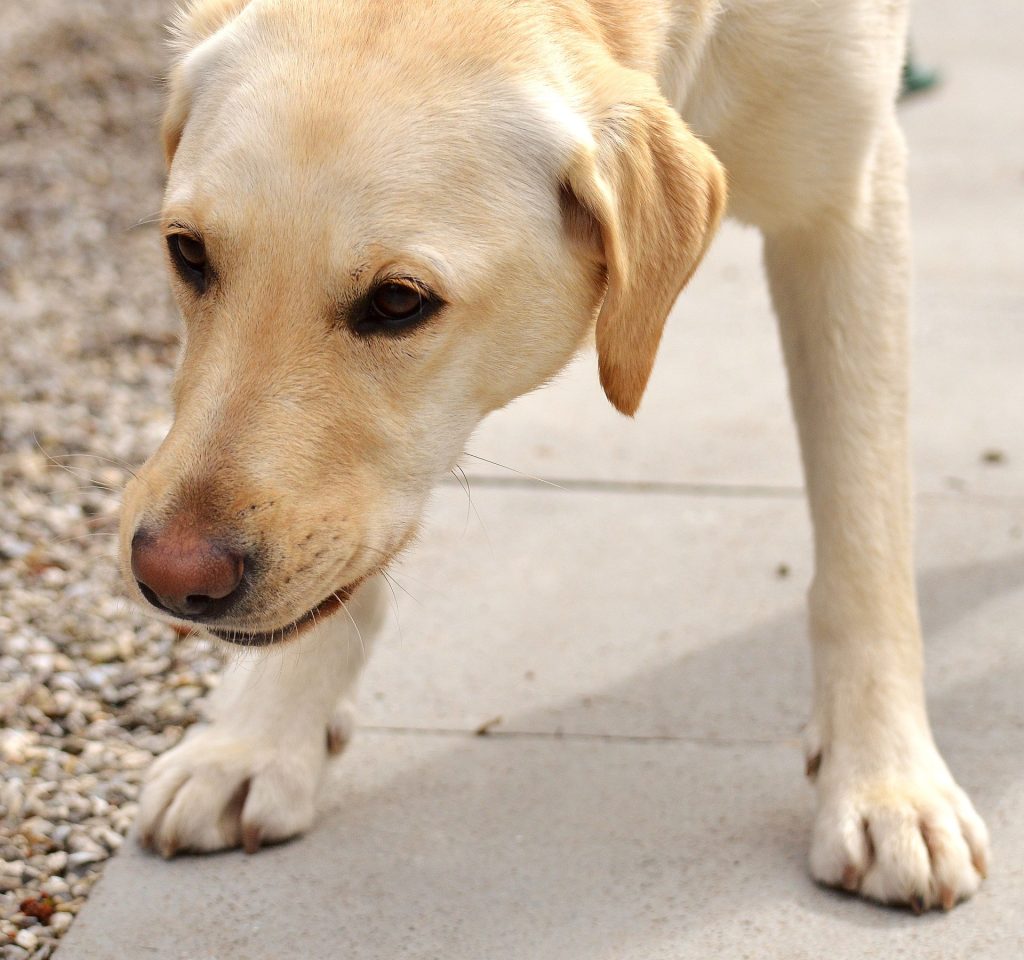
Please Complete The Puppy Reservation Form (above) BEFORE making a payment.


What Is A Dudley Labrador?
Have you ever heard of a Dudley Labrador? Are you wondering what a Dudley Labrador is? A Dudley Labrador is a unique-looking Lab that has a slightly different coat color than the traditional black, yellow, and chocolate Labs. The Dudley Labrador’s coat is an unusual light silver, almost tan color, and can also have patches of white.
Dudley Labradors are not uncommon, but they are fairly rare. They were first bred in the late 1990s and have since become popular with Lab lovers looking for something a little different. Although they do not have any specific health concerns, their unusual coloring means that potential owners should be aware of the fact that their coat is more prone to sunburn than traditional black or chocolate Labs.
This article will discuss Dudley Labrador’s temperament, physical characteristics, and potential health issues. We also cover some important facts about owning a Dudley Labrador, including what to look for when choosing one and how to care for them once you bring them home. Keep reading to learn more about this distinctive breed!
Dudley Labrador Origin
According to the American Kennel Club, breeding that produces a rare genetic mix is often how Dudley Labs are produced.
Due to the fact that chocolate Labrador is the least frequent hue among Labradors, Dudley Labs are occasionally referred to as chocolate Labs “with a yellow Labrador’s body.”
You can cross a chocolate Lab with particular genetic qualities and a yellow Lab with related genetic traits to produce the Dudley Lab. A Dudley is a rare outcome among the several possible breeding combinations that might result from Labrador breeding.
Regular yellow Labs are born with pink noses, but very quickly after birth, they start to change color. Dudley’s nose will stay pink its entire life. Even though Dudley Labs are classified as yellow Labs, they are still considered purebred Labrador Retrievers.
Unfortunately, Dudley Labs cannot currently be categorized as show dogs. Be advised that the unique Dudley Labs are currently ineligible for qualification if you choose a Labrador based on that dog’s ability to compete in dog shows.
Due to Dudley Labs’ rarity, many Labrador Retriever breeders will purposefully refrain from breeding the dog combinations that are most likely to produce Dudley’s lack of pigmentation.
Dudley Characteristics

Dudley Labs resembles all other Yellow Labradors without peculiar skin tones.
They are robust, muscular canines ranging from medium to huge. Men typically weigh 65 to 80 pounds, but women typically weigh 55 to 70 pounds. Male canines can reach heights of 22.5 to 24.5 inches, and females can reach heights of 21.5 to 23.5 inches.
Dudley Labradors have a broad skull, solid cheeks, and a powerful muzzle. They also have even-sized noses that are black in color, while others have pink noses. The muzzle is slightly pointed at the tip and becomes broader toward the eyes. Their thick, full tail is carried level with their back and has sleek fur on them.
They have straight, short, thick coats. They are protected from water, cold temperatures, and various types of ground cover by soft, weather-resistant undercoats.
Throughout their history, their coats’ qualities were quite important. Labradors were the typical Newfoundland water dogs used as duck retrievers. They often went out on boats with fishermen, retrieving the fish that fell off the trawl. Their coats helped them to stay buoyant and warm in the cold waters.
The thick “otter” tail that Labrador Retrievers have is one of their distinctive characteristics. These tails helped them fulfill their primary function of retrieving better by acting as strong rudders when swimming.
Dudley Lab Temperament
The Dudley Labrador Retriever’s personality is much like that of the traditional black and yellow Labs: they are loving and gentle, eager to please, and highly trainable. They enjoy playing games such as fetch and Frisbee, but their soft coat means that they don’t need a lot of activity.
Dudleys also tend to be very loyal and protective of their families, but they are not usually aggressive toward strangers. They can learn a range of tricks and commands with ease, and some may even show signs of being able to ‘talk’ back by barking or making specific noises in response to certain commands.
Dudley Labs are excellent family pets and make great companions for active families. They may be a bit slower to mature than other Labradors, but they usually reach full physical and mental maturity around the age of two or three.
Due to their intelligence, Dudley Labs can also be taught various useful tasks. Some are even trained to be service animals for those with physical disabilities.
Dudley Labradors Lifespan
Dudley Labrador Retrievers have a 10- to 14-year lifetime. According to a UK study, Labrador Retrievers have an average life expectancy of 12 years.
The survey also revealed that cancer and musculoskeletal conditions are the most typical killers of this dog breed. Compared to Yellow and Black Labradors, the lifespan of Chocolate Labradors is one year less.
Although it looks excessively brief, it is typical for canines of their size. Larger dogs typically live less time than smaller dogs. This doesn’t necessarily imply that your pet Lab will only live as long as usual. The oldest Labrador known to humans was 19 years old.
To maximize your pet’s lifespan, make sure to provide them with a balanced diet and plenty of exercises. Also, have regular vet check-ups and take them to get vaccinated as needed.
Health Concerns
The health of the dog as a whole is unaffected by the Dudley nose. The same health problems that affect other Labrador Retrievers can also affect Dudley Labs.
Although they are more prone to sunburns due to their lack of pigmentation, this could be a severe issue for dogs living in warmer climates because prolonged sun exposure increases their risk of skin cancer in later life.
To protect their delicate noses in the summer, keep your Dudley Lab puppy out of the direct sunlight and apply dog sunscreen.
Like all dogs, regular veterinarian visits are also important to ensure that you can address any underlying health problems early on.
Obesity, ear, and joint issues are the most prevalent ailments afflicting Labrador Retrievers. This breed’s most frequent causes of mortality are cancer and musculoskeletal conditions.
Because they are driven by food, labs are more likely to be obese than other dog breeds. The likelihood that the dog will develop metabolic and respiratory illnesses, bone issues, arthritis, and heart and liver disorders increases with weight.
When they are pleading with you for more food, it may be difficult to say no to their gorgeous expressions, but you must be strong and tell them when enough is enough. At first, they won’t be pleased, but it will prevent difficulties in the future.
Caring For Your Dudley Labrador
Do you have a Dudley Labrador Retriever? They are unique and special little pups that need extra care to stay happy, healthy, and active.
✅ Grooming
Grooming is one of the most important aspects of keeping a Dudley Lab’s coat and skin healthy. Regular brushing to remove any dead fur and dirt will help keep your pup’s coat soft and shiny.
Also, Dudley Labs can have sensitive skin, so make sure to use a gentle shampoo that won’t irritate them.
✅ Pink Nose and Paws Care
Due to their delicate pink noses, Dudley’s labs are easily burned by the sun. Sunburn and hyperkeratosis are the two conditions they frequently experience due to their sensitivity and lack of pigmentation. The skin ailment hyperkeratosis causes pink noses and paws because it produces too much keratin. The skin becomes thicker and harder, eventually cracking and developing various illnesses.
To maintain the smoothness and ensure the protection of the lovely pink nose, you should get an excellent nose balm. Additionally, spending money on paw balm is necessary, which will shield labs from infections and skin diseases.
✅ Exercise
Exercising your Dudley Labrador is essential for maintaining a healthy weight and keeping them active. Taking them for walks and hikes is a great way to give them the physical activity they need.
Playing fetch, Frisbee, or other games with your pup is also a great way to have fun while encouraging them to move and burn off energy.
✅ Training
Dudley Labradors are intelligent, eager to please dogs, and can be easily trained. Positive reinforcement is usually the most effective way to train them and help establish a strong bond between you and your pup.
Regular training can also help strengthen their problem-solving skills and allow them to learn useful tricks.
✅ Diet
As with all breeds, providing your Dudley Lab with a balanced diet is essential for their health. A combination of high-quality dry or wet dog food and fresh vegetables and fruits should make up the bulk of their diet.
Always provide them with clean water throughout the day and check that their food has all of the necessary nutrients for their age, size, and activity level.
Dudley Labrador Retrievers are special and unique dogs that need a little more care and attention than other breeds. With proper nutrition, exercise, grooming, and training, your Dudley Lab will be a wonderful companion for many years to come.
How To Train A Dudley Labrador Retriever
Dudley Labrador Retrievers are highly intelligent and sociable, making them ideal family pets. However, they can also be quite spirited, so their training needs to be consistent and patient.
Start basic obedience training as soon as you bring your Dudley puppy home, and use positive reinforcement whenever possible. Teach your pup the basic commands such as sit, stay, come and leave it.
Be patient and consistent while training your pup, and reward them with treats or toys when they understand a command. You can also use games to keep them engaged and entertained while they learn.
Socialization is also important for Dudley Labs and should start from an early age. Introduce them to different people, other animals, and new environments so that they become comfortable with them.
Dudley Labrador Retrievers are wonderful companions that need consistent training and love to be around people. With patience and dedication, you can have a happy and well-trained Dudley Labrador Retriever.
Frequently Asked Questions
Q: Why do Labrador noses have a distinct color?
A: Many Labradors have a liver-colored nose that is unique to their breed. The darkness of the liver-colored nose can range from light brown to almost black, depending on the individual dog. However, Dudley Labradors typically have pink noses due to a lack of pigment.
Q: Does a black Labrador have a higher risk of health issues?
A: Black Labradors generally have the same risk of developing health problems as colored Labradors. However, some studies have shown that black Labradors may be more prone to certain conditions, such as hip dysplasia and eye problems.
Q: What Labrador has a brown nose and a black nose?
A: Most Labradors have black noses, but some may have brown noses. In particular, Dudley Labradors are known for having a pink nose due to a lack of pigment. Some Labradors may also have white markings on their noses which is another unique trait of the breed.
Q: Can a golden retriever and a Labrador have puppies together?
A: Yes, golden retrievers and Labradors can produce offspring. However, the puppies may not be purebred, and it is usually not recommended as there can be health risks associated with a cross-breed.
Q: Can I use paw pads for teaching my Labrador Retriever?
A: Yes, you can use paw pads for training your Dudley Lab. They are a great tool to help teach basic commands as well as tricks. Additionally, paw pads are a great way to keep your pup entertained and help build their confidence in new situations.
Q: What breed standard should I look for when buying a Dudley Lab?
A: When looking for a Dudley Lab, you should look for the breed standard of an English-style Labrador Retriever. This includes a broad chest, strong legs and feet, a short coat that is thick and glossy, a pink nose, and a well-proportioned body. Additionally, Dudley Labs should have an even temperament and be excellent with children.
Final Words
Dudley Labrador Retrievers are fantastic pets for families and individuals alike. With their intelligence, loyalty, and friendly disposition, they make wonderful companions. However, it is important to be patient and consistent when training a Dudley Lab and give them lots of love and attention. With the right care and training, your Dudley Lab will be a loyal and loving companion for years to come.